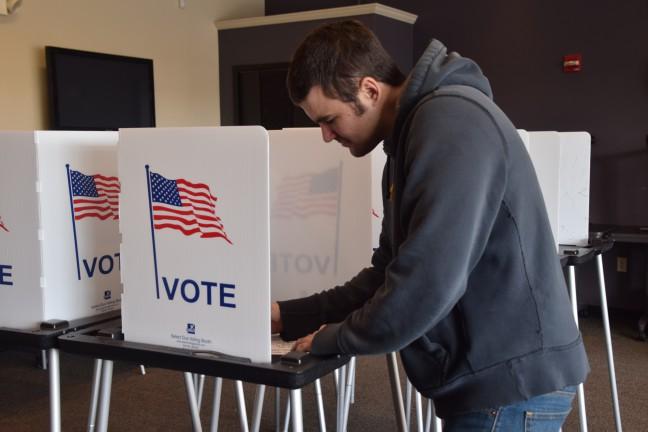A bill that passed through the state Assembly Feb. 17 would make Wisconsin the next state to put voter registration online, but critics say this move toward technology might leave some voters behind.
The bill, proposed by Sen. Devin LeMahieu, R-Oostburg, and Rep. Kathleen Bernier, R-Chippewa Falls, would make electronic voter registration possible. This would create a more efficient and effective voter registration process.
Wisconsin is behind in voting technology, which has been costly, Bernier said. With this legislation, Wisconsin will join 30 other states that have already adopted online registration policies, she said. She added Wisconsin will also save on labor and paper costs that are attributed to conventional registration practices.
Currently, special registration deputies are responsible for helping people register to vote, Jay Heck, Common Cause Wisconsin executive director, said. He said this bill would eliminate the role special registration deputies play in voter registration.
“The trade off in this legislation is you can register online, but these SRDs no longer can register you,” Heck said.
Heck said the special registration deputies program makes registration more convenient for University of Wisconsin students and other people who want to register to vote.
Under the bill, citizens will need a Department of Transportation identification card to register online. Without such identification, people will have to go the City County Building to register, which most people might not do because of time constraints, he said.
Sally Rohrer, Associated Students of Madison’s University Affairs Committee chair, said eliminating special registration deputies would be detrimental to ASM’s efforts to register students at UW.
Rohrer said ASM voter drives brings the registration process to students, helping them, especially out-of-state students, become eligible to vote. ASM sent an open letter to Assembly Speaker Robin Vos, R-Rochester, defending SRDs.
“Voter registration drives put on by ASM for the gubernatorial election in November increased voter turnout by 150 percent from the previous year,” Rohrer said.
LeMahieu said in a statement the bill would not eliminate voter registration drives and would put Wisconsin in the 21st century, maintain cleaner voter rolls and reduce possible errors and fraud.
Bernier said it is important people learn how to register themselves instead of relying on special registration deputies.
“To think that other people are supposed to take care of your privilege and responsibility to vote is not the right way of thinking,” Bernier said. “You have to do a little bit on your own in order to cast your ballot.”
Bernier said Wisconsin is one of the few states that has an SRD program and believes it poses a security threat. She said she was surprised people were willing to share personal information about driver’s licenses and bank statements with SRDs despite risk of identity theft.
Bernier said passing the bill would have no effect on voter turnout in the long run. She said most people are registered to vote and information on how to vote is easily accessible. The bill, she said, will only make the registration more efficient and effective.
But both Heck and Rohrer said the bill would hurt voter turnout.
Rohrer said in fall 2015, ASM registered around 500 students who would not have been able to vote if this bill was passed at the time.
Heck stressed people who do not have a driver’s license or are not in the Department of Transportation system will be negatively affected.
“Everybody thinks that it is good to have online voter registration, but it is really limited in the sense that you have to already be in the DOT system in order for it to work … but if not, it is almost impossible to register online,” Heck said.
But Bernier said this will not limit people who want to register. She said people without a driver’s license or DOT-related identification can mail in registration information or can register on voting day at the polls.
Rep. Debra Kolste, D-Janesville, said Democrats originally supported the bill, but withdrew their support once the elimination of SRDs became part of the it. She said if SRDs are not available to register voters, less people will have the opportunity to vote.
“Democracy works best when everyone has equal and simple access to voting,” Kolste said.
The bill will head to the Senate after it passed in the Assembly 56-38 .














